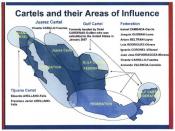Hoque, Jahanara
A-2 Sullivan
2/1/2011
Introduction
History of Drug War
"The Food and Drug Act of 1906 required that all ingredients and products be revealed to consumers, many of whom had become addicted to substances falsely marked safe" (Ojeda 23)
Having it legal doesn't make it better, contrary to the present popular belief
This serves as a cautionary tale to all modern drugs, prescription or recreational
"As for demand reduction, in 1992, the U.S. Government funded more programs on training, public awareness, epidemiology, and education in Latin America and Southeast and Southwest Asia. INM programs trained 3,000 demand-reduction experts worldwide." (US Department of State Dispatch Web)
Lots of programs in the countries that produce the most, never stated effectiveness
Yet still major power struggle
"Over the last 3 years, [eliminating] narcotics money-laundering has evolved into an important foreign policy and financial management priority in both small and large financial center countries.
The Financial Action Task Force established by the G-7 summit in 1989 has been influential and valuable in this regard." (USD web)
The issue is not lack of sanctions, but lack of protection
Clearly, not a top priority anymore 20 years ago
"President Felipe Calderon declared war on the country's drug cartels shortly after taking office in December 2006, the Mexico City daily Reforma reported." ("Murders Topped 11,500 in Mexico Last Year, Newspaper says" web)
"A total of 11,583 people were murdered in Mexico last year,"("Murders Toppedâ¦" web)
The facts speak for themselves
The toll rises
Drug trafficking exists heavily and will only get worse
" U.N international drug control program, Illicit drug business generates ad much as 400billion dollars in trade annually, " (Kallen 58)
If they can calculate it, they know where its coming from
So they're not doing enough to stop it.
"Crimes include gang wars to control markets; methamphetamine manufacturing sites that are a bio hazard; and deaths caused by drug impaired drivers" (Kallen 50)
They affect everyone
No drug is safe
"The illegal drug-trafficking industry continues to be strong, ruthless, rich, and adaptable."(USD web)
Statement written with no end in sight
Admits defeat, incapability
Drug violence justice is incompetent, and enforcement will remain so if status quo doesn't change
"The US assistance has enabled the Mexican marines to carry out the kind of rapid-strike operations undertaken by US forces against Taliban leaders in Afghanistan, the report said" ("US Forces Helping Mexico in Battle Against Drug Cartels" web)
Party like it's Afghanistan ya'll
It's that serious
"Mexican officials deny that the US military is training Mexican marines, and the Pentagon declines to discuss the training, The Post said."("US Forces"⦠Web)
Either party doesn't admit to helping hand
There should be no reason for this
"Gangland violence may actually increase in 2011 across Mexico, Reforma reported, citing experts. ("Murders Topped" web)
Bad forecast for the future
That's that status quo
"The marines then go into action, sometimes capturing, sometimes killing their targets in spectacular urban firefights often within hours, the paper noted." ("US Forces" web)
Such military like preciseness
The casualties outnumber the success rate
Those most affected lack the vital rehabilitation, so the vicious circle continues
Are "Shut out of opportunity due to jail & drug history" ( Kallen 57)
Stigma
Recover, relapse, repeat
"The lure of illegal drugs involves a desire for intense pleasure and instant reward" "Drug users are⦠lost in the self and present, the person is neither preparing for the future or learning from the past." (Ojeda 23)
Rather have temporary high than struggle, get back on track
Not being productive
"Stigmas are created to act as a deterrent to drug use, they often actually promote it by limiting the options of the victims of the 'War on Drugs'("Stigma Increases Likelihood that Drug Users Reoffend" web)
What is meant to help, makes the situation worse
Shame can lead to a vicious cycle
Conclusion
Drug War Failure
Drugs, legalization, crime, abuse, blood, money, violence, land, justice, and war- these are a few words that come to mind when considering the unsuccessful war against drugs. The actions and consequences are seen every day by thousands of individuals, both directly and indirectly. The current efforts are inherently ineffective when considering the most paramount reasons: the amount of money lost and gained due to drug trafficking and its stress on governments, the status quo of drug violence justice, and the lack of treatment for the most wounded victims; the addicted individuals.
The Drug War contains a long history of failure and countless lives that did not have to end. It proves from the start, that legalization will not lessen the harms of drug related problems when in "The food and drug act of 1906 required that all ingredients and products be revealed to consumers, many of whom had become addicted to substances falsely marked safe" (Ojeda 23). Over a century ago, the drug cocaine was used as a calming agent for psychotic patients because of its soothing factor. Since there was no regulation in place, it was not a crime to use it; consequently, this created thousands of addicts dependent on it to get through the day, because of its legal status. Actual effort to stop addiction did not occur until 1992 "As a demand for reduction⦠the U.S government funded more programs on training, public awareness, epidemiology and education in Latin America" (US Department of State Dispatch web). The last time drug laundering money was an important foreign policy and financial management priority was at the G-7 summit in 1989, over 20 years ago (USD web). "Many countries now openly admit the dangers posed by narcotics trafficking and domestic consumption and are actively combating the problem as a matter of their own national interests", not collaborating with other countries is an ineffective way to lead to a solution (USD web). More recently "President Felipe Calderon declared war on the country's drug cartels shortly after joining office in December 2006", ("Murders Topped 11,500 in Mexico Last Year, News Paper Says" web). Efforts have been increased since, but the current state is certainly the worst it has ever been. The death toll reached 11, 583 people at the end of 2010, in Mexico alone. ("Murders Topped" web). With so many casualties, hope for a better future is uncertain.
What is even more concerning is the revenue produced by this crime. According to the U.N, the drug trafficking industry generates at least four hundred billion dollars a year (Kallen 58). This amount could only have been calculated with knowledge of where the products were coming from; however, this depicts a great horror, when even with the intelligence, governments are not trying hard enough to stop the illicit trade. These are the fruits of crimes which include, but are not limited to, gang wars to control markets; methamphetamine manufacturing sites that are a bio hazard; and deaths cause by drug impaired drivers" (50). Not only does drug manufacturing harm individuals and those around them, but they endanger environment as well. Despite having a positive outlook, the Department of State gradually accepts that "the drug trafficking industry continues to be strong, ruthless, rich, and adaptable (USD web). Admitting this undeniably proves the claim that the Drug War has become such a massive problem that governments cannot or aren't able to fix. It also proves that those who control the trade have power over the government. The bureaucracy acceptance of drug trafficking is an enormous defeat with major consequences.
The justice system remains weak and incapable of collaboration to receive help. "The U.S assistance has enabled the Mexican marines to carry out the kind of rapid- strike operations under taken by U.S forces against Taliban leaders in Afghanistan, ("U.S Forces Helping Mexico in Battle against Drug Cartels" web). The violence is on such a heightened level of seriousness that missions are acted out on the likelihood of that of combat with Afghan militants, while at the same time "Mexican officials deny that U.S military is assisting Mexican marines, and the pentagon declines to discuss this training" (U.S Forces web). If neither party admits, then the accuracy of these missions remains questionable. These operations are supposed to garner a notion of stability, but did not succeed. Such militarily like preciseness should not result in low success rate. Unfortunately, gangland violence is expected to increase in 2011 across Mexico, ("Murders Topped" web). What this means for the U.S is increased insecurity on its borders, as crime rates go up; no one is safe. When the motto of our police enforcement "to protect and serve" are not practiced, the actions that are, are a farce. Surely border patrol will increase, with the intention to justify the increased death rate.
This complements the lack of assistance to those who need it the most. A depressing image is formed when considering that "Drug users are lost in the self and present, the person is neither preparing for the future nor learning from the past (Ojeda 23). If the person is not planning ahead, or using what they have learned and applying it to the present, they are in essence, doing nothing that will benefit them or others in the long term. The constant need to obtain and use their illegal substance is a consuming need. For this reason, frequent offenders are "shut out of opportunity due to jail & drug history" (Kallen 57).When the justice system understands this and utilizes a systematic approach to reintroducing people into society, then and only then will this lifestyle dissipate. Often times, what is intended to discourage drug abuse, backfires. The major issue here is that "Stigmas are created to act as a deterrent to drug use, they often actually promote it by limiting the options of the victims of the 'War on Drugs'("Stigma Increases Likelihood that Drug Users Reoffend" web). Facing the stigma or shame that drug abusers are bad people often times will cause the individual to not seek out help and those who do, face the chance of relapse because of this stigma. The constant struggling to rehabilitate while being barraged by those who ought to be helping the individual implicates a vicious cycle. Hence, changing the view on drug abusers as a society is vital, and lack of it denies any improvement in the Drug War front.
Drug trafficking remains the top most drug related crime, violence ensues due to lack of law enforcement, and drug abusers get the help they need, in order to be accepted to society and contribute to it. Drugs, legalization, crime, abuse, money, violence, land, and war are words that have described the Drug War in its past and present. One day, perhaps hope, rehabilitation, and peace will replace the dreary picture it is today.
Works Cited
Kallen, Stuart A. Legalizing Drugs. Farmington Hills, MI: Greenhaven, 2006. 49+. Print. "Murders Topped 11,500 in Mexico last year, newspaper says." EFE World News Service 2 Jan. 2011. General OneFile. Web. 4 Jan. 2011.
Ojeda, Auriana. Drug Trafficking. San Diego, CA: Greenhaven, 2002. 22-23. Print.
"Review of U.S Efforts to Combat the International Narcotics Trade." U.S Department of State Dispatch 24 May 1993: 386+. General OneFile. Web. 10 Jan. 2011.
"Stigma Increases Likelihood that Drug Users Reoffend." Women's Health Weekly 28 May 2009: 21. General OneFile. Web. 13 Feb. 2011.
"US Forces Helping Mexico Battle Against Drug Cartels." Newsmax 4 Dec. 2010. General OneFile. Web. 4 Jan. 2011.


